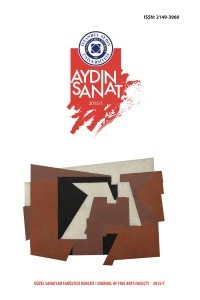Robert Wilson’ın Sahnelemelerinde Teatral Kodların Parçalanması Bütünlük – Parçalılık – Süreksizlik – Estetik
Günümüz sanatında sıkça kullanılan “postmodern” terimi, çağdaş tiyatro sahnelemelerinde en çok ‘Yeni Biçimselcilik’ tanımıyla bilinen Robert Wilson’un sahnelemelerinde karşımıza çıkmaktadır. 1960 sonlarından başlayarak çalışmalarında uzamsallığın ve görselliğin ortaya çıkması ile farklı dilleri bir arada kullanarak yeni bir sahnelemeye imza atan Amerikalı yönetmen, aynı zamanda farklı kültürlerden gelen oyuncularla çalışmaktadır. Bu makalede yönetmenin tiyatrosunun yapısal özellikleri irdelenecek ve bu bağlamda Wilson’un sahnelemelerinde teatral kodların parçalanması tartışılacaktır. Robert Wilson’un Brecht’in tam karşısında duran anlayışı üzerinden Brecht ve Wilson’un estetik perspektiflerinin karşılaştırılması ise çalışmamızın diğer bir çatısını oluşturacaktır
Anahtar Kelimeler:
Tiyatro, Robert Wilson, Brecht, Estetik
Disintegration of Theatrical Codes in Robert Wilson’s Plays Integrity – Fragmentation – Discontinuity – Aesthetics
In the case of contemporary theatre, the term “postmodern” frequently used in contemporary art, appears in the stage screenings of Robert Wilson, who is mostly known for his definition of “New Formalism”. Since the end of 1960s with the emergence of spatiality and visual quality in his works the American director created a new stage screening technique using different languages as well as working with different actors and actresses from various cultural backgrounds. In this article the structural characteristics of the director’s theater will be examined and in this context “breaking of theatrical codes in the stage screenings of Wilson” will be discussed. Based on Robert Wilson’s conceptualization which stands directly opposite of Brecht’s, a “Comparison of the Aesthetic Perspectives of Brecht and Wilson” is another angle of discussion presented in this work
Keywords:
Theatre, Robert Wilson, Brecht, aesthetics,
- ISSN: 2149-3960
- Yayın Aralığı: Yılda 2 Sayı
- Başlangıç: 2015
- Yayıncı: İstanbul Aydın Üniversitesi
Sayıdaki Diğer Makaleler
20. Yüzyıl Giysi Tasarımında Pli ve Farklı Yorumları
Yüzleşme Oyunları: II. Dünya Savaşı ve Nazi Almanya’sının Tiyatroya Yansıması
Sanal Ortamda Karşıt-Kamusal Alanlar Yaratmak: Dijital Eylemci Ağları
Çağdaş Sanatta Gösteriye Dönüşen Acı
Günümüzün Değişen Paradigmasında Eğitim ve Sanat
Yeni Sanatçı, Yeni İzleyici, Yeni Sanat Teknolojileri ve Çağdaş Sanat Eğitimi
Zihinsel Engelli Bireylerde Görsel Sanat Eğitimi
Kayıp Aranıyor: Çağdaş Sanatın Kuramsal Dili ve Eleştirel Yanılsama
